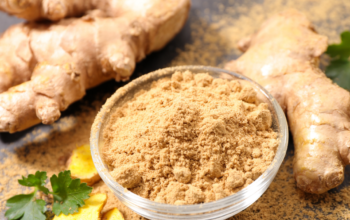Have you ever tasted curry or used it in your cooking? You have turmeric to thank for that! Turmeric (Curcuma longa) is another root spice found in the ginger or Zingiberaceae family. It is also quite beneficial to the body so let us look at 8 health benefits of turmeric!
Introduction
Although it is mainly known for being the main ingredient in curry powder, turmeric is used in the making of mustards, creams, kinds of butter, cheeses, teas, and a variety of other foods.
Like ginger, the spice finds its origin in Southeast Asia and was used for centuries in Indian and Chinese medicine and cuisine. It was used as a treatment for stomach illnesses, rheumatism, chronic pain, and inflammation.
Where ginger root has a light yellow color when cut open, turmeric has a brighter yellow or orange inside that stains when touched. Its earthy, almost bitter taste sets it apart from ginger’s spicy, sharp one.

The turmeric plant has long, broad leaves and leaf stems that connect to the rhizome underground.
It can grow 3 or more feet in height and sometimes sprout small yellow-orange, greenish-white, or pink flowers.

Turmeric contains a group of compounds called curcuminoids. These are scientifically proven to have some medicinal effects. Curcuminoids include curcumin, demethoxycurcumin, bisdemethoxycurcumin, and cyclic curcumin. However, curcumin is the active ingredient and this chemical gives the root its color, fragrance, flavor, and a wide array of health benefits.
Curcumin only makes up about 2 to 9% of turmeric. Some people are more likely to use turmeric supplements to increase the chemical’s availability.
Since the body poorly absorbs curcumin, supplements or spice are used, which increases the absorption rate significantly.
Mixing the turmeric with healthy fats such as coconut oil, almond, or coconut milk, using the whole turmeric root, and heating the spice also helps increase curcumin’s bioavailability.
Below are the health benefits that are provided by turmeric.
Anti-inflammatory and antioxidant properties

Curcumin is a natural anti-inflammatory compound. Like ginger, it can hinder the action of inflammatory genes and molecules triggered by diseases that are caused by long-term inflammation. These include diseases like arthritis, ulcerative colitis, and inflammatory bowel disease. Curcumin also rids the body of free radicals and helps lower oxidative stress. It is helpful to note, however, that curcumin is most beneficial when taken in the correct amount.
Boosts the brain’s neurotrophic factors

Brain-derived neurotrophic factor, or BDNF, is a gene in charge of making the protein responsible for the growth of neurons. High levels of this gene have positive effects on memory and learning, whereas low levels of this gene are linked to brain disorders such as Alzheimer’s and depression. Studies show that curcumin passes the blood-brain barrier, increases the BDNF, and clears inflammation found in the brain. This helps improve memory and attention, and also treats mood disorders since it can alter the levels of serotonin and dopamine in the brain. More research is being done on this topic.
Lowers the risk of heart diseases

Curcumin increases heart health in many different ways. As stated before, its anti-inflammatory and antioxidant properties help it fight against and prevent diseases caused by inflammation and high oxidative stress. Curcumin can also help improve the function of the blood vessel lining and help fight against high cholesterol. These effects help lower your risk of disease significantly.
Boosts liver function

Curcumin lowers the damage harmful substances have on the liver by lessening inflammation. It also encourages bile production and releases from the gallbladder which eliminates toxins from the body. Turmeric also prevents or reduces the buildup of fat in the liver or nonalcoholic fatty liver disease that can cause liver damage if left untreated.
Eases symptoms of osteoarthritis

Turmeric extracts are known to help relieve knee pain, stiffness and inflammation in people with osteoarthritis. Some studies show that turmeric can almost work as well as ibuprofen.
Improves skin health

Turmeric aids skin tissue repair and improves the skin’s collagen synthesis. Some claim that turmeric’s anti-inflammatory, antioxidant, and antimicrobial properties market it as a treatment for certain skin disorders. However, there is no real scientific evidence of this.
Helps to prevent and treat cancer

While more research has to be done on curcumin’s role in treating cancer, it is known that the compound can target cancer cells, hinders their growth, and stops tumor development on a molecular level. It is said to have positive results on cancers like pancreatic cancer, prostate cancer, and multiple myeloma.
Great benefits for longevity

Since turmeric works against oxidation, inflammation, and a variety of diseases, all factors which speed up the aging process, it can be said that turmeric has great benefits for longevity.
So as we can see, the health benefits of turmeric are vast and there is still more research being done to find out other ways this spice can benefit mankind.
Also, check out the following article




